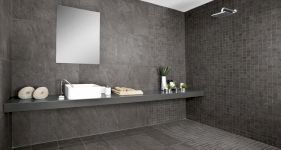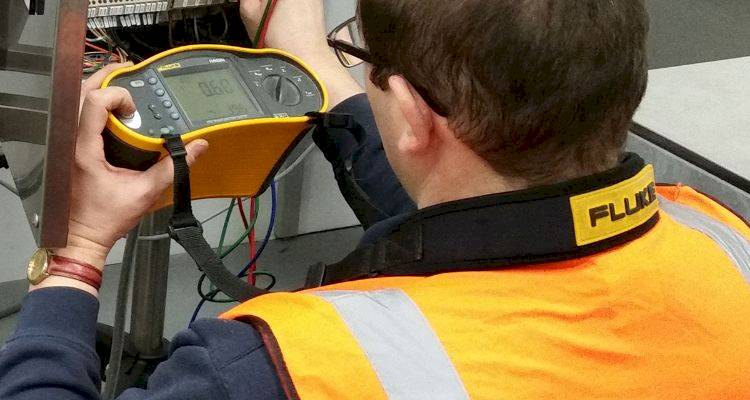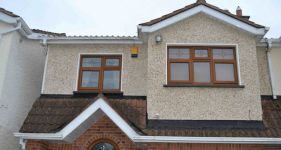Quartz Worktop Cost
- The average cost of a Quartz worktop is £250 per metre
- Depending on the complexity, the job will take approximately 3 hours to complete
- The cost of installing quartz worktops
- Quartz worktop prices
- Additional costs you may need to add to your budget
- Labour costs and how to find a tradesperson
- The considerations of removing existing worktops
Many people spend time thinking about the type of kitchen cupboards they want without putting the same amount of thought into the installation of a kitchen worktop. But it’s your kitchen worktop that’s used the most. It not only has to be durable, but its surface also has to withstand cooking utensils, plates and cups, cutlery, pots and pans and foodstuffs. And keep its attractive appearance.
Quartz worktops are growing in popularity in the UK owing to their durability, aesthetics and low maintenance. Quartz is available in a wide range of colours and patterns, so you can be sure to find a worktop that has character and style. It has other benefits, too: it’s scratch and stain-resistant with a non-porous surface.
Read our quartz worktop guide to find out how much you’ll need to budget and what quartz will cost to buy and install in your kitchen.
Want to find out more about Quartz Worktop costs?
Depending on the complexity of the job, you can expect to pay, on average, around £1250 for 5 metres of kitchen worktop.
When you need a professional to install Quartz worktops, we can help you get free quotes.
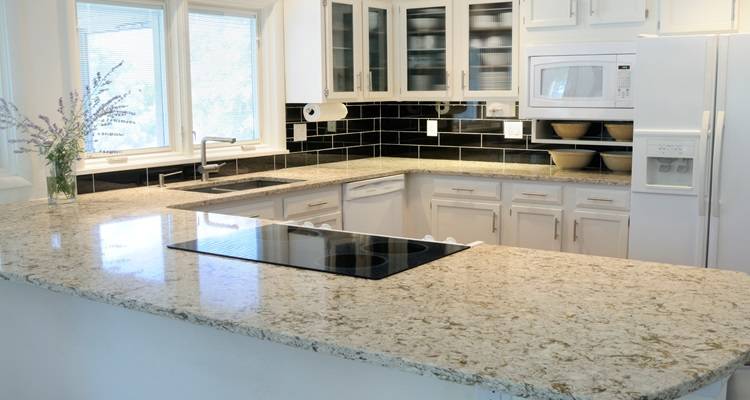
£1250
Table of Contents
- How Much is A Quartz Worktop?
- Quartz Worktop Prices
- Supply Costs for Quartz Worktops
- Additional Costs
- Labour Costs and Timescales
- Cost Factors for Quartz Worktops
- Building Regulations
- Types of Quartz Worktops
- Alternative Types of Worktops
- Hiring Contractors Checklist
- Removing Existing Quartz Worktops
- FAQs
How Much is A Quartz Worktop?
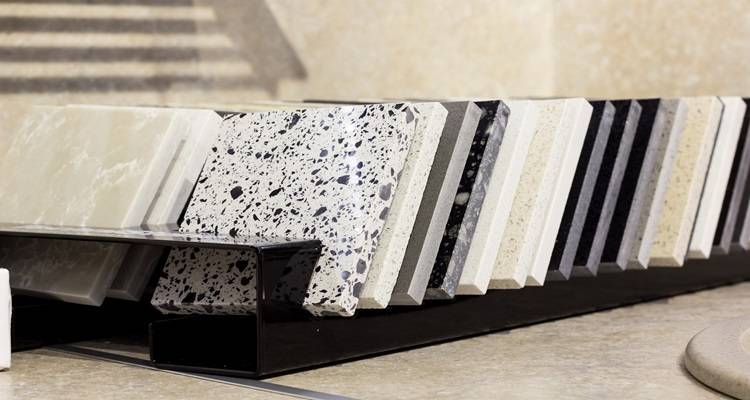
Quartz worktops aren’t cheap, but you are paying for a material that’s long-lasting and highly practical for a kitchen surface. There are a number of things that affect the price, and they include:
Thickness
Machine-manufactured quartz worktops are commonly available as 20mm or 30mm thickness. This measurement will affect the cost. A 30mm quartz worktop will be more expensive than one at 20mm.
Brand
Some brands of quartz are more expensive than others. They usually offer wider design options and better quality. Paying more for a quartz worktop may also mean that you can customise the shapes and sizes you require for your kitchen.
Size
The total linear metre or square footage also has a bearing on cost. A small kitchen with 3 metres of worktop will cost less than a kitchen with 5 metres.
Design and pattern
Cheaper quartz worktops don’t have as much variety in design and pattern as a more expensive brand.
Location and Supply
Labour costs are usually higher in London and the South East of England. This means that your installation costs may be higher than those of other parts of the UK. Cost may also differ depending on where you buy your quartz worktop.
Installation costs will also depend on how easy it is for the kitchen fitter to install the worktops. You will pay extra if access is difficult or you need worktops cut and shaped.
If you have a carpenter designing and manufacturing your kitchen and worktops, you’ll be paying more. Prices will also vary between DIY stores, furniture outlets and specialist kitchen showrooms.
Quartz Worktop Prices
Quartz slabs for kitchen worktops are sold either by linear metres or square metres. Linear metre measures the length. A square metre is the length times the width.
These are average costs. If you are shopping online, you’ll find many suppliers who prefer to supply a quote, which may include extras such as edging options and cutouts.
If you decide that your budget can’t stretch to a natural quartz worktop, you could choose a laminate worktop that mimics quartz. You can buy quartz-look laminate for between £40 and £60 per metre.
Here are some average quartz worktop prices:
*These prices are per linear metre| Quartz Type | Quality | Thickness | Average Cost |
|---|---|---|---|
| Polished | High-End | 20mm | £600 - £660 |
| Polished | High-End | 30mm | £640 - £685 |
| Polished | Mid-Range | 20mm | £355 - £415 |
| Polished | Mid-Range | 20mm | £370 - £440 |
| Polished | Standard | 20mm | £205 - £260 |
| Polished | Standard | 20mm | £220 - £280 |
| Leathered | High-End | 20mm | £670 - £750 |
| Leathered | High-End | 30mm | £700 - £800 |
| Leathered | Mid-Range | 20mm | £320 - £350 |
| Leathered | Mid-Range | 20mm | £420 - £500 |
| Leathered | Standard | 20mm | £320 - £345 |
| Leathered | Standard | 20mm | £350 - £395 |
| Honed | High-End | 20mm | £600 - £800 |
| Honed | High-End | 30mm | £650 - £850 |
| Honed | Mid-Range | 20mm | £400 - £550 |
| Honed | Mid-Range | 20mm | £550 - £600 |
| Honed | Standard | 20mm | £220 - £280 |
| Honed | Standard | 20mm | £290 - £320 |
Supply Costs for Quartz Worktops
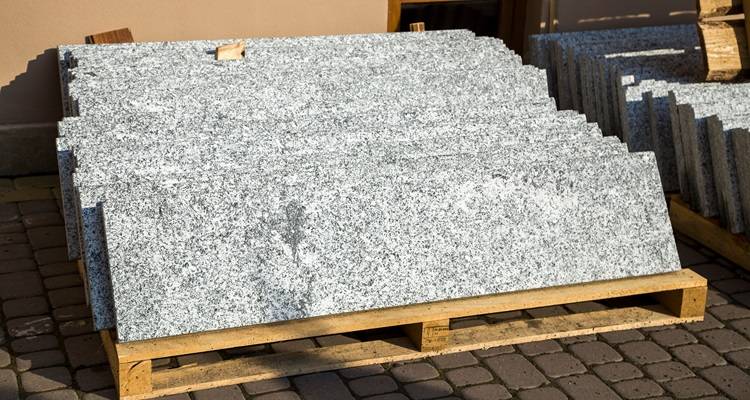
The supply costs for quartz worktops depend mainly on the quality and the brand you buy.
If you are paying for top-quality quartz, it will:
- Have minimal veining
- Contain a low level of resin
- Have a smoother finish
- Have a good shine
Mid-Range quartz:
- Contains more resin than a high-end slab
- The finish may contain some flaws
- It has less shine
Cheaper Quartz:
- Contains more resin than top-quality or mid-range slabs
- Has more flaws
- It may have a duller shine
Resins make the quartz more porous and less scratch-resistant. Quartz normally contains an amount between 90% and 95% quartz and an amount between 10% and 5% resin.
High-end quartz slabs contain around 96% or 97% quartz and 5% or 6% resin. Mid-range slabs can contain 93% quartz and 7% resin. Standard quartz may contain around 90% quartz and 10% resin. If you find very cheap quartz, it may be because it only contains around 40% quartz with 60% resin.
Other items that will have a bearing on the cost of a quartz worktop will be:
- Tap holes
- Cutouts
- Sink drainer
- Sealants and adhesive
- Amount of worktop required
- Sealants and adhesive
If a carpenter cuts your holes and cutouts after you have bought the worktop, you could be looking at between £175 and £190. Polished cutouts are more expensive than unpolished cutouts.
Creating grooves for a drainer is, on average, between £140 and £160. Sealant and adhesive is likely to cost under £50.
Additional Costs
The additional cost of a quartz worktop could include:
Upstands – Quartz upstands are usually sold in 300mm lengths, and the price on average is between £70 and £140.
Trimmings – Trimmings or edging strips cost, on average, between £8 and £17 for a roll of 3 metres.
Optional protective or sealer – You can expect to pay between £20 and £30 for coating or sealer, which are usually sold in half or one-litre containers.
Splashbacks – The cost of a splashback will depend on the size you want. But prices on average range from between £200 to £400.
Edge profiling and customisation – Creating a curved corner or a rounded edge will cost in the region of £15 per edge or corner.
Waste Removal and Disposal of Old Worktops
A specialist kitchen shop might offer to take the old worktop away if you are having the old one replaced. If you have to dispose of it yourself, you may need to hire a driver and a van to transport the old worktop to the waste or recycling centre.
The cost of a driver and van will depend on where you live in the UK. Average costs are between. and per hour. You’ll pay more in London and the South East of England.
Disposing of the worktop at a waste or recycling centre depends on your local authority. Check your local or recycling centre website for information on charges.
Another additional cost might also be the hire of a skip, which you may need if you have a large kitchen or are removing your worktops and cabinets. Skip hire will cost, on average, between £90 and £440, depending on whether you are hiring a mini skip or a large 12-yard skip.
Transport and delivery fees – These costs depend on where you buy your worktop. If you buy from a shop or online, then delivery could be between £20 and £40. If your worktop has been made by a local carpenter and they are also going to install the slab, then it may be that delivery will be free because travel may be included in the quote for installation.
The Cost of a New Kitchen
You might well be looking at a quartz worktop because you are renewing your kitchen cupboards and units, too. The average cost of fitting a new kitchen is between £2,000 and £10,700, depending on the size of your kitchen.
A small kitchen usually has 8 units and one worktop. A medium kitchen may have 12 units and 2 worktops. In a large kitchen, you might find 16 units and 3 or 4 worktops.
Labour costs for installation can range from £500 to £1,500, working between 4 and 6 days.
Labour Costs and Timescales
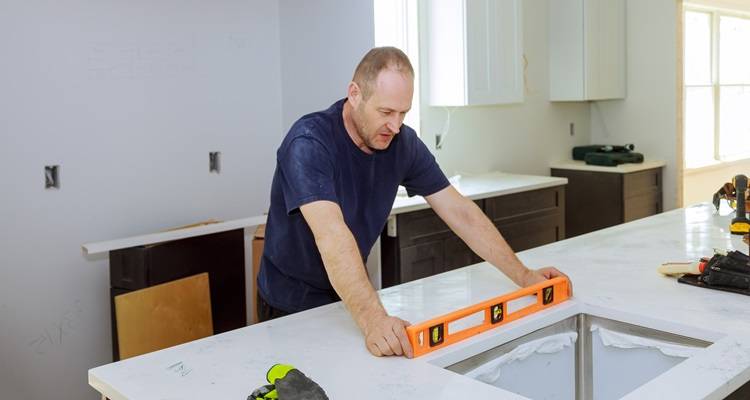
It is likely that you will have your worktop fitted at the same time as the rest of your kitchen, and this will be done by a carpenter or kitchen fitter. If this is the case, then the price of the worktop installation will be included in the kitchen installation cost.
The average costs for kitchen installation are:
| Kitchen Size | Duration of Job | Average Cost |
|---|---|---|
| Small Kitchen 9m2 | 3 to 4 days | £500 |
| Medium Kitchen 15m2 | 4 to 5 days | £1000 |
| Large Kitchen 20m2 | 5 to 6 days | £1500 |
If, however, you are replacing your worktop and that’s the only item you need to be installed, then your costs for a carpenter to fit the slabs will be, on average, between £54 and £66 for 3 hours of work.
If you have a large kitchen with more than one worktop, then the job might take a full day. A carpenter will usually charge between £18 and £22 an hour, which is a day rate of between £144 and £176. It will also take longer if you have an irregular-shaped kitchen or access is awkward.
The length of time it takes to install a worktop will also depend on whether or not any necessary cutouts and holes have already been completed or whether you need the carpenter to do those jobs.
Expect to pay more if you live in London or the South East of England, where service charges are generally higher than in other parts of the UK.
Cost Factors for Quartz Worktops
The biggest cost factor for quartz worktops is the material itself. Higher quality quartz is more durable, stain resistant and scratch resistant and has a more polished finish, so it is more expensive than lower quality quartz.
The thickness of the quartz worktop also plays a big part in the cost. Thicker slabs require more raw material and are heavier, so both the material cost and installation cost will be higher due to the additional structural support required.
The pattern and design of the quartz worktop have a big impact on the overall cost. More complex designs, unique veining and complex patterns require more advanced manufacturing techniques, so they are more expensive than simpler or more uniform styles.
Ease of installation is another factor that affects the cost. If the worktop requires more cutting, shaping or fitting into an irregular space, the installation will take longer and require skilled labour, so the total cost will be higher.
Whether the quartz worktop is bespoke or factory-produced also impacts the cost. Bespoke worktops tailored to specific dimensions and designs are more expensive than mass-produced ones as they require more skilled craftsmanship and extra production time.
Lastly, delivery costs should be added to the total cost. Quartz slabs are heavy and large, so transportation can be costly, and prices will vary depending on the supplier, distance and if extra handling or special delivery arrangements are required.
Building Regulations
If you are replacing an existing kitchen and you are not changing the location of the sink or cooker, then you won’t need to inform your local authority, as building regs won’t apply. However, if your kitchen renovation includes installing gas, electricity, and water appliances in new locations, then building regulations apply.
You will need to visit your local building regulations office and tell them about your plans. They will then advise you about fees and inspections.
If you use certified professionals under the competent persons scheme, you won’t need a building regs inspection. A tradesperson working under the competent person’s scheme is able to self-certify their work under building regulation rules.
Types of Quartz Worktops
Polished Quartz

The surface of polished quartz has been ground using fine abrasives to produce a natural shine. Polished worktops are also non-porous, which means spills (if cleaned up quickly) won’t leave stains.
Polished quartz costs between £205 and £700 per metre, depending on the quality of the quartz.
Leathered Quartz
A leathered finish is achieved by removing the shine and creating a texture that resembles leather. It has a rougher texture, which gives the worktop a country-style look. Another advantage is that it chip or scratch.
Leathered quartz costs, on average, between £320 and £800 per metre
Honed Quartz
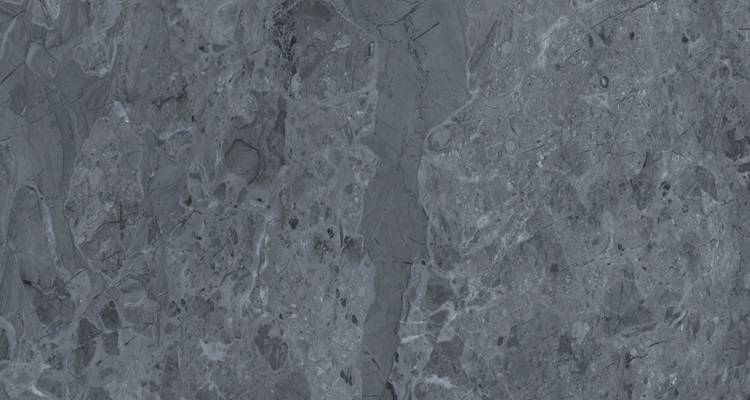
Honed quartz is a matte satin finish, which means fingerprints or smudges don’t show up. Honed worktops aren’t non-porous, which means you have to be careful when using liquids on the worktop surface.
Honed quartz costs, on average, between £250 and £850 per metre
Pros of Quartz Worktops
- ✔ Resistant to stains and bacteria
- ✔ Doesn’t scratch
- ✔ Strong and durable
- ✔ Low Maintenance
Cons
- ✖ High Cost
- ✖ Heat damage may lead to discolouration
- ✖ It’s not a natural material
Alternative Types of Worktops
Comparing the different types of materials used for worktops before you buy quartz is always a good idea. These are some of the most popular worktop materials you’ll come across:
Laminate
If you want an affordable option, then laminate will save you money. The cost of laminate per linear metre is between £40 and £120 depending on the pattern, style and thickness. Laminate worktops are made of MDF particleboard, which gives them strength and durability. The board is then covered with a sheet of laminate. This is manufactured with colours and patterns and can also mimic the look of wood or stone.
Pros of Laminate
- ✔ Less expensive than other worktop materials
- ✔ Available in a wide range of designs and colours
- ✔ Easy installation – A good DIY choice
- ✔ Easy to fix if you need a DIY repair
Cons
- ✖ Water and heat can cause the laminate to warp
- ✖ Less durable than other materials
- ✖ The seams and edges are visible
Stainless Steel
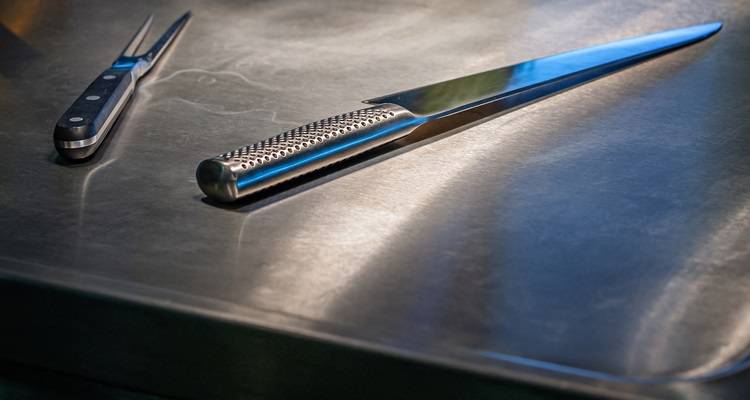
Stainless steel is a popular choice in professional kitchens because it is easy to clean and heat resistant. Stainless steel costs around £150 for a 600mm worktop length
Pros of Stainless-Steel Worktops
- ✔ Easy to clean
- ✔ Heat resistant
- ✔ Resists germs and bacteria
Cons
- ✖ Cost
- ✖ It’s industrial appearance may not suit your kitchen style
- ✖ Dents and scratches easily
Wood
Wood is a popular choice for a kitchen worktop because it is stylish and practical. It can be sanded and stained if it begins to look worn. It’s also an affordable option. You can expect to pay around £108 per linear metre.
Pros of Wood Worktops
- >
- ✔ It’s a natural material
- ✔ Easily repaired
- ✔ Long-lasting
Cons
- ✖ Must be oiled to prevent water damage
- ✖ More complex to install than other materials
- ✖ It can easily be scratched
Porcelain
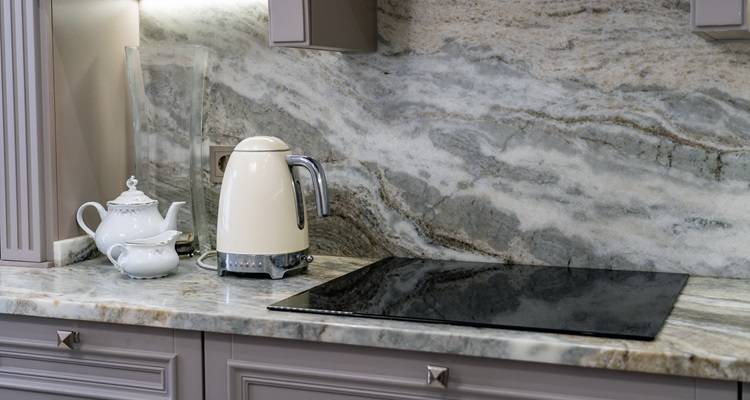
Porcelain worktops are popular with householders who want the look of natural stone without the price tag. It is similar strength to quartz and stronger than granite. You can pay on average between £200 and £300 per m2
Pros of Porcelain Worktops
- ✔ Doesn’t scratch or stain easily
- ✔ Heat Resistant
- ✔ Durable
Cons
- ✖ Cost – more expensive than some other worktop materials
- ✖ Will crack under pressure from a very heavy object
- ✖ It can’t be fixed once broken
Copper
Copper is a practical worktop material that also ticks the boxes for beauty and style. It develops its own patina over time, which means your worktop won’t look like any other’s, and it will be unique to your household. Copper isn’t cheap to buy. You’ll pay around £400 for a 1000mm length of worktop.
Pros of Copper Worktops
- ✔ Hygienic – Copper is anti-bacterial
- ✔ Easy to keep clean
- ✔ Unique
Cons
- ✖ Can scratch and dent
- ✖ Very hot pans and plates could leave burn marks
- ✖ More expensive than some other worktop materials
Natural Stone
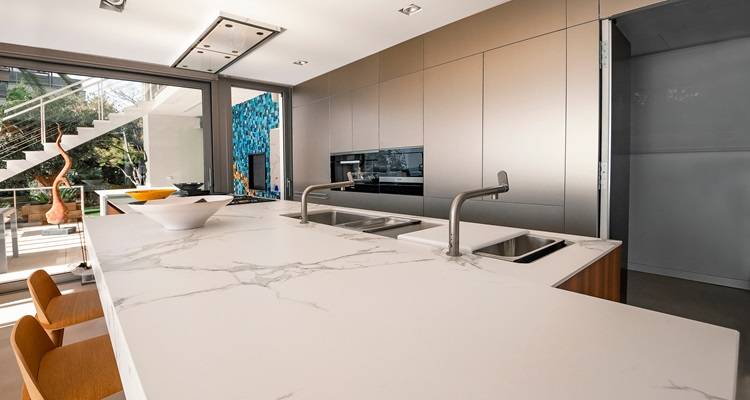
Natural stone worktops aren’t cheap, but they are very practical materials for a kitchen, especially one that has an enthusiastic cook. Natural stone includes quartz and marble, but granite is also a popular choice for a worktop surface. Natural stone is an expensive investment. Expect to pay between £275 and £600 per m2
Pros of Natural Stone Worktops
- ✔ Heat proof – you can put a hot pan on the surface of a stone worktop
- ✔ Long-lasting
- ✔ Unique appearance
Cons
- ✖ Will need sealing before use
- ✖ More expensive than most other materials
- ✖ Edges can chip
Marble
Marble has always been associated with luxury and style. It comes in colours that include greens and pinks, and it has a naturally cool surface. The cost of a marble worktop is, on average, between £300 and £400 per m2
Pros of Marble Worktops
- ✔ Long-lasting
- ✔ Heat resistant
- ✔ Each worktop is unique
Cons
- ✖ Can Scratch
- ✖ Needs to be sealed before use
- ✖ Can stain easily
Stone Composite
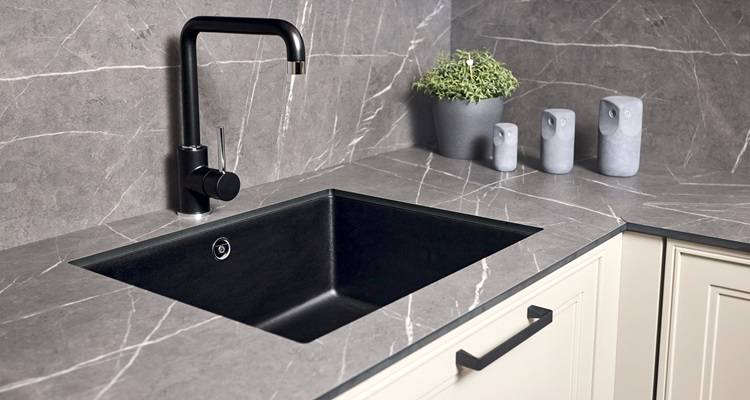
Composite worktops are made of stone, minerals, resin, and pigments for colour; corian worktops are an example of this. It is a malleable material, which means it can be shaped or coloured to create a unique kitchen design. You can pay between £200 and £250 per m2 for a stone composite worktop
Pros of Stone Composite Worktops
- ✔ Scratch and stain-resistant
- ✔ Durable
- ✔ Low maintenance
Cons
- ✖ May discolour over time
- ✖ Heat resistant, but not heatproof like stone
- ✖ Heavy – Not as easy to install as some other worktop material
Hiring Contractors Checklist
Here is a checklist of things you should consider when you want to hire a contractor to install your quartz kitchen worktop:
- Ask for the quote to be fully itemised so that you can compare quotes easily
- Check they have the experience and qualifications that are needed to do the job
- Ask about insurance. A contractor should have Public Liability Insurance, which will cover property damage or an accident while they are working at your premises
- Ask an installer if they can remove and dispose of your old worktops and, if so, include the price for this in the itemised quotation
- Obtain at least 3 quotes and compare each one
Removing Existing Quartz Worktops
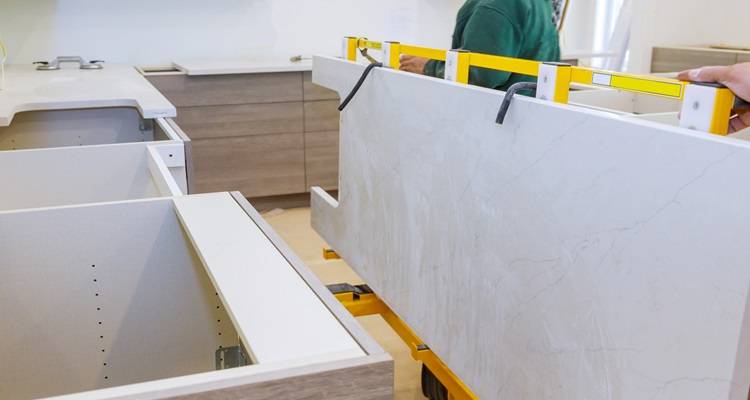
Ask for the quote for installation to include the removal of the old worktop if you don’t want to do the job yourself or the old worktop is made of heavy material like stone. It is likely that an installer will charge you for around an hour’s work at the cost of between £18 and £22 an hour.
If you decide you can remove the worktop, then it is usually done by unscrewing the worktop from the cabinets below and manoeuvring the top until it comes away.
If your worktop is still in good condition or it’s the type that be renovated, you may want to consider giving it away or selling it through your local free ads or a Facebook page.
FAQs
What is a quartz worktop made of?
How do you clean a quartz worktop?
What are the benefits of a quartz worktop?
The main benefit is its durability. It can last you a lifetime. It is also scratch-resistant, which means that there are no bacteria lurking in a score mark. Another benefit is its low maintenance. A regular wipe-down with soapy, warm water will keep the quartz clean. Plus, it’s available in a wide range of designs, colours and patterns to suit any type of kitchen.


